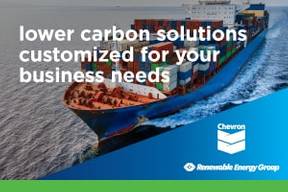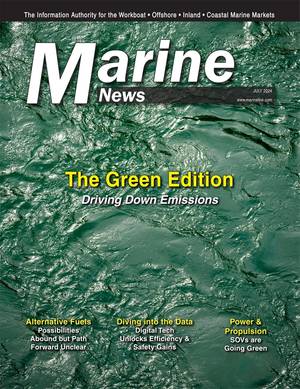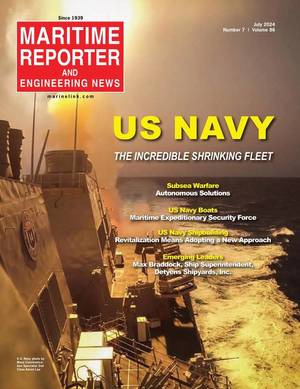ioCurrents: Deep Diving into the Data
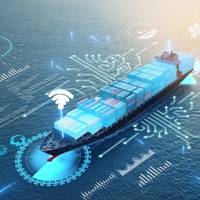
When setting out to maximize efficiency on board any type of commercial vessel, it’s most beneficial to look at the big picture, taking into account the entirety of its systems and operations, but examined at a granular level. Traditionally, this has been much easier said than done.But latest advancements in cutting-edge artificial intelligence (AI) and machine learning technologies like those being leveraged by Seattle-based tech company ioCurrents are unlocking new possibilities.
Oil Tankers on Fire After Colliding Close to Singapore, Crew Rescued

Two large oil tankers were on fire on Friday after colliding near Singapore, the world's biggest refuelling port, with two crew members airlifted to hospital and others rescued from life rafts, authorities and one of the tanker operators said.Singapore is Asia's biggest oil-trading hub and the world's largest bunkering port. Its surrounding waters are vital trade waterways between Asia and Europe and the Middle East and among the busiest global sea lanes.The Singapore-flagged…
California Ferry Operator AITF Moves to Electrify Its Fleet in CARB-backed Project
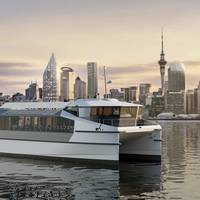
Angel Island Tiburon Ferry (AITF), in California, has tapped New-Zealand-based EV Maritime to design a plug-in hybrid electric vessel for its fleet in the San Francisco Bay Area. The project, which will also see the electrification of two existing AITF vessels, has been funded by the California Air Resources Board (CARB). The hybrid ferry will be designed and engineered by EV Maritime with electrical integration provided by ZeroMar, a local company in the Bay Area.“This new vessel will be plug-in hybrid…
Crowley Christens the US' First Electric Tug eWolf
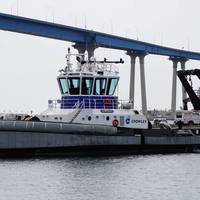
Crowley on Tuesday christened its new vessel, eWolf, the first all-electric ship assist tugboat in the United States.Set to enter commercial service at the Port of San Diego this week, the 82-foot tug was built by Coden, Ala. shipbuilder Master Boat Builders and designed by Crowley’s engineering services team to operate on full electric power, producing zero carbon emissions and 70-ton bollard pull strength.“The eWolf is a historic milestone in the maritime industry and Crowley’s legacy and underscores our company’s commitment to serve as global sustainability leaders and innovators…
US Harbor Craft: Measuring Opportunity for Zero Emissions
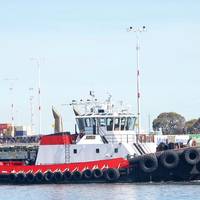
There are more than 4,000 harbor craft vessels in the U.S. deemed highly suited for zero-emissions operations, according to a recent report produced by CALSTART in partnership with Intelatus Global Partners.The report - “Sizing the U.S. and California Harbor Craft Market” - looked at the U.S. commercial harbor craft and inland and nearshore vessels above 600 kilowatts (kW) or 805 brake horsepower. Approximately 10,000 vessels were counted in total, including crew and supply boats…
CTS-VMS Partnership Targets Maritime Industry Decarbonization
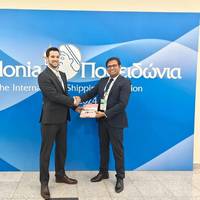
CTS Offshore and Marine (CTS) and Varuna Marine Services (VMS) have entered strategic partnership to offer vessel owners and operators an informed pathway for carbon emission management.By combining their respective strengths, the two companies will provide a comprehensive suite of services to help the maritime industry navigate the complexities of decarbonization and comply with evolving regulations such as the EU Emissions Trading System (EU ETS) and FuelEU.CTS brings expertise in fleet decarbonization…
Damen, Atal Solutions Join Forces for Green Refit of BAM Shipping’s Four Bulk Carriers
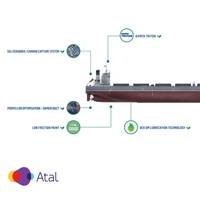
Damen Shipyards has partnered up with Atal Solutions and other parties to retrofit four bulk carriers for Bam Shipping with fuel-saving and emission reduction technologies.The industry partners will integrate eight different proven technologies, which will result in bulk carriers consuming at least 20% less fuel and reducing up to 99% greenhouse gases (GHG).The increased efficiency paves the way for these and other existing vessels to sail in compliance with recent regulations such as the Energy Efficiency Existing Ship Index (EEXI) and Carbon Intensity Indicator (CII).Additionally…
ABB Introduces Optimal Speed Routing to Improve Vessels Fuel Efficiency
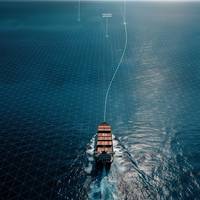
ABB has introduced a new feature to its Routing Services portfolio that will allow vessel owners to manage fuel costs by optimizing vessel optimal route and speed at the same time.As the first solution in the market equipped to optimize track and operating speeds simultaneously against anticipated weather, the feature is included in the ABB Ability Routeguard onshore routing service.This represents the first upgrade since ABB acquired the shipping business of DTN Europe BV and…
Has Container Peak Season Come Early?

A combination of the ongoing Cape of Good Hope diversions, a stronger-than-expected demand rebound and weather delays in major Chinese ports is the most likely explanation for the freight rate rally of the past four weeks, according to MSI.MSI’s HORIZON monthly containerships report points out that the speed and strength of the unexpected rally took shippers in mainlane East Asia to Europe and North America trades by surprise.Similar dynamics were soon seen in second-tier trade lanes as well…
Seaman’s Manslaughter

How to avoid and address potential prosecution following marine-incident deaths.In recent years, there has been a resurgence in criminal prosecutions of maritime personnel, vessel owners and operators and other individuals and corporations under the federal Seaman’s Manslaughter statute (18 U.S.C. § 1115). Recent examples of such prosecutions include the guilty verdict against Jerry Boylan, who was the captain of the Conception, a 75-foot passenger vessel that caught fire and burned to the waterline while anchored at Santa Cruz Island, Calif.
Elliott Bay Design Group, ioCurrents Partner to Drive Maritime Innovation
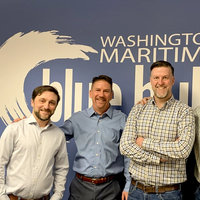
Naval architecture and marine engineering firm Elliott Bay Design Group (EBDG) on Monday announced it is teaming up with data analytics company ioCurrents to help drive innovation in the maritime industry.Under a newly signed memorandum of understanding (MOU), the partners have established a collaborative framework to explore new ideas for collecting and evaluating operating and performance data to reduce vessel cost, emissions and other potential benefits to the maritime industry.
Charting the Future: Hiroaki Sakashita President & CEO, ClassNK
![Decarbonization will [most dramatically] change the structure of seaborne trade, ships’ specification and design, ships’ operation, and the economic mechanism of maritime transportation.
– Hiroaki Sakashita, President & CEO, ClassNK
Image Courtesy Class NK](https://images.marinelink.com/images/maritime/w200h200c/onization-will-most-dramatically-change-149951.jpg)
ClassNK is one of the world’s leading maritime classification societies with more than 9,200 ships totaling more than 273 million gross tons under class at the end of 2023, and a global service network of more than 120 survey offices. Last month while in Tokyo we had the opportunity to sit with Hiroaki Sakashita, President & CEO, ClassNK, a marine industry veteran for his insights on the trends driving ship classification today and in the future.Hiroaki Sakashita took the helm at ClassNK at one of the most historically significant times in history…
Consortium Forms North Pacific Green Corridor
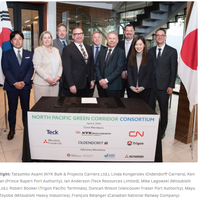
Global industry leaders from North America, Asia and Europe have announced the formation of the North Pacific Green Corridor Consortium (NPGCC) whose members and partners will work together to decarbonize the value chain for commodities between North America and Asia.The NPGCC will apply its collective expertise to develop a corridor for the decarbonized transportation of multiple commodities, including agricultural products, metal concentrates and steelmaking coal.The members of the NPGCC are committed to establishing the consortium as a catalyst for decarbonization efforts…
Insights: Jennifer Carpenter, President & CEO, American Waterways Operators

Jennifer Carpenter joined The American Waterways Operators (AWO), the national trade association representing the inland and coastal tugboat, towboat and barge industry, in August 1990 and became its president and CEO in January 2020. She highlights some of the greatest focus areas for the 80-year-old trade group—simultaneously looking at both the present day and the road ahead.The towboat, tug and barge industry is in a period of rapid evolution. How is AWO—now in its 80th year…
On Board the eWolf: The First Electric Tugboat in the US
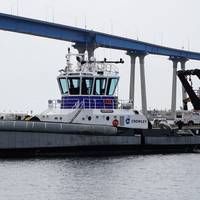
Crowley Maritime Corporation has owned and operated a lot of vessels since its founding in 1892. But the latest vessel to join its fleet is unlike any other that has come before it.Crowley’s new harbor tug, eWolf, is unique in that it runs 100% powered by batteries, not diesel engines, meaning it produces zero emissions and nearly no noise. Not only is the vessel the first fully electric tug in the Crowley fleet, but it is also the first of its kind in the United States.Faced with stricter regulations and commercial pressure to prioritize environmental…
PPG Unveils New ‘Ultra Low-Friction’ Vessels Coating
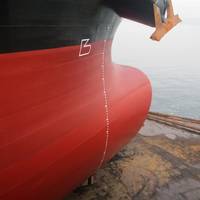
PPG has launched the PPG NEXEON 810 coating, described as an innovative copper-free antifouling coating developed with a strong emphasis on vessel performance, emissions reduction and sustainability.Independent tests, following ISO 19030 and International Towing Tank Conference standards, have confirmed that the ultrasmooth surface of PPG Nexeon 810 coating can yield an immediate boost in power of up to 10% and enhance operational efficiency by up to 15%, according to PPG.This is due to improved fouling control performance…
US Offshore Wind: Down but Not Out
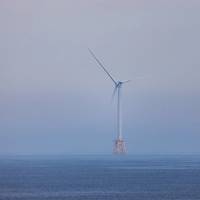
“The winds of change are blowing wild and free.” – Bob DylanIn the U.S. offshore wind industry, developments over recent months have placed an exclamation point on the word “wild”. Yes, the wind still blows “free”, but mounting challenges have proven that harnessing its power offshore is anything but. In fact, far from it, as rising materials costs, high interest rates, labor shortages and supply chain delays, among other issues, have delivered heavy blows to the commercial viability of several projects.
Glamox to Light Up PGS’ Seismic Vessels
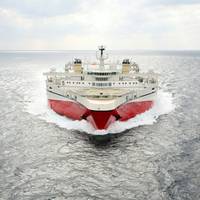
Lighting solutions specialist Glamox has won a contract from PGS to provide marine LED lighting for eight of its vessels that undertake seismic surveys of the seabed.This first phase of the major retrofit project will involve replacing fluorescent tube lighting with around 2,500 marine-certified LED luminaires fitted on the exterior and interior of the eight vessels.PGS’s switch to energy-efficient LED lighting is being driven by its desire to comply with emission reduction targets…
MARAD Designates More Centers of Excellence for Maritime Training
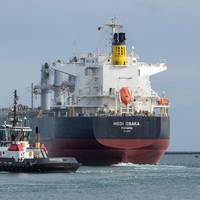
The U.S. Department of Transportation’s Maritime Administration (MARAD) announced the designation of 32 Centers of Excellence (COE) for Domestic Maritime Workforce Training and Education. The designated COEs consist of 50 maritime training locations across 17 states and Guam. The designation recognizes and promotes support to post-secondary maritime training programs that prepare students for careers in the maritime industry.“Our country depends on a highly-skilled mariner workforce to strengthen both our economy and our national security,” said U.S. Transportation Secretary Pete Buttigieg.
Seatrium Renews Exclusive Deal with Gaslog and Shell for LGN Carrier Repairs
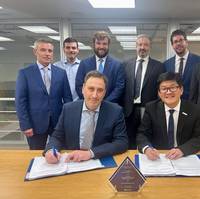
Singapore-based Seatrium has renewed its long-term favored customer contract (FCC) with GasLog LNG Services and Shell International Trading and Shipping Company (STASCO) to provide ship repairs, refurbishment and upgrading for their LNG carriers until 2029, with further renewal options.The contract marks a collaborative partnership between Seatrium and these two leading maritime companies with whom the Singaporean group has established a long history of collaboration.The contract involves the repairs…
MARAD’s Title XI Changes: Good News for Offshore Wind?

The U.S. Department of Transportation's Maritime Administration (MARAD) in December issued a final rule updating its financial requirements for the Federal Ship Financing Program, commonly referred to as Title XI. While the move applies to the U.S. maritime industry as a whole, it is seen as especially helpful for players looking to serve the U.S. offshore wind sector.Designed to promote the growth and modernization of the U.S. merchant marine and U.S. shipyards, Title XI provides for a full faith and credit guarantee by the U.S. government. The program essentially aims to encourage U.S.
Future Ships: Picture Perfect
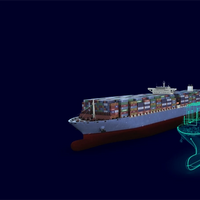
Big data, advanced computers and AI are allowing vessel designers to prepare models that leave essentially nothing to chance.“Lastly, it may be of considerable importance to form from the draught a block model of the vessel from which a still more accurate judgment may be formed of the fitness and beauty of the body. And should any defect be discovered, farther alterations must still be made, till the draught and the model are perfectly approved of. These different alterations and repeated calculations may appear very tedious…
BAR Tech Signs European Supplier for Wind Propulsion Systems

BAR Technologies, a developer of wind propulsion systems, has entered into partnership with floating offshore wind platforms pioneer Nervion Naval Offshore to manage and oversee the production of BAR Technologies’ wing sail design WindWings in Europe.The agreement with Nervion, a company owned by Amper Group and with factories in Ferrol and As Somozas in Galicia, Spain, is the first manufacturing partnership for BAR Technologies outside of China.It is expected to provide European customers…


